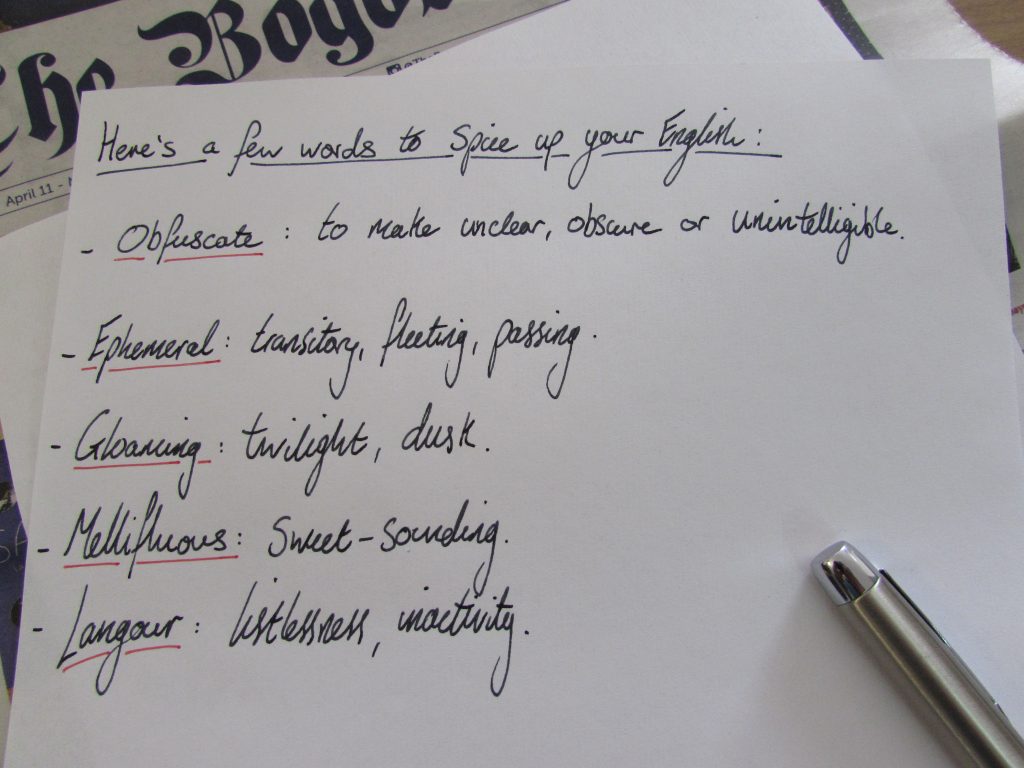
Get the most out of your study time.
What makes some people remember new words and others not? Here are some tips to help you step your English up a level by actually retaining some of what you’ve learnt.
Over years of teaching students in three different continents, I’ve noticed that some are very successful at grasping languages, and others continue to have trouble learning. So what is it about the students that do well? Sometimes, they’re just a bunch of poindexters that find it easy to study. Irritating for some, but good for them. What I’m interested in this month are the students that make the most of their limited abilities to do well – sometimes better than the students who find everything easy.
These simple tips will help you learn and remember vocabulary more efficiently, and therefore become a better user of English. After all, seeing the words isn’t a problem for any student; but remembering and using the words correctly can definitely be.
Repeat; reuse; recycle
You know how your teacher keeps trying to get you to reuse your vocabulary? There’s a reason for that: if you don’t reuse it, it disappears. There’s really no point in just looking at vocabulary lists and ticking them and moving on. You need to be able to use the words.
So, look for ways you can reuse those words. Talk about subjects connected to those words, so that you are forced to use them. See how many times you can repeat the word in a single paragraph.
Identify key words for you
You might have spent a long time learning English from books and through dull teachers. Vocabulary lists are a favourite of many teachers: they occupy students for a long time and make the teacher look like they are doing lots of work. However, many of those words are a complete waste of time.
Everyone has different reasons to use a language, and everyone has different interests in life. Those vocabulary lists aren’t designed for that: they’re designed for most people. You might be a person who works in aeronautics or who rides a bicycle. For those things you’ll need specific vocabulary, so look it up and start using it as much as possible.
One of my best ever students did very well because she got frustrated with the books she was using in classes previous to mine and started making her own lists of useful vocabulary – mostly focussing on swearing.

Some of our favourite unusual words in the office.
Actively think about the words you use
Do you know a young child? Maybe you have a young cousin, niece or something like that. Think how you speak to them. I assume you don’t use complex words with that child. Do the same in your second language – think about the language that your listener will understand. There’s a time to practise using words you’re not sure about – but there is also a time for making sure that you can communicate.
For example, I often use words that are unusual in English but I think might exist in Spanish. Collaborate, for example is not a word I often use when speaking to other English native speakers, but it will be easy for Spanish speakers to understand. Equally, a Spanish speaker using collaborate in English might sound a bit strange, but they will probably be understood.
Complex grammar with simple vocab and vice versa
If you’re not sure about the grammar you’re using, keep the vocabulary simple. This means that if you make a mistake with the grammar, you can probably still communicate. After all, that’s generally the point of most interactions.
This works the other way, too. If you have to use complex vocabulary that you are not really sure about, keep the grammar simple to avoid a double mistake. Communication is key, and if there is a single mistake it’s quite easy to understand the meaning.
Related: More English Language tips and tricks
Attack the things you find hard
A lot of words in English come from Latin, and they’re really easy for Spanish speakers to understand and to learn. So, ignore them a bit. After all, this is something that is easy for you. Look at the words that are more difficult to remember and use them more often.
For example, if a word is hard to pronounce, practise it! Use it as much as possible in classes. It will help you get better. You might find it difficult at first, but the more you use it, the easier it will become with time.
Some words are just not necessary
You need to understand which words you need to learn that are useful for you. It’s also necessary to identify the vocabulary that isn’t necessary in your life. Older books, for example, might still have references to screensavers – which almost no one seems to have on their computers these days. If you’re not planning to leave Colombia for a while, a lot of vocabulary to do with trains will be useless to you. Bad teachers will always insist that you learn every word for a potential test: in the real world this isn’t really a good idea.
Identify potential problems
Some words create problems for almost all students. For example, carrera and career confuse almost all of my students. So, if you see a word that you know is a false friend (a word in one language that looks like a word in another language but has a different meaning), take note of this.
You should start remembering and correcting yourself more frequently with these words, or double-check yourself whenever you use them. Also, again, reuse it and recycle. I know that advice is becoming boring, but it’s also very useful.





